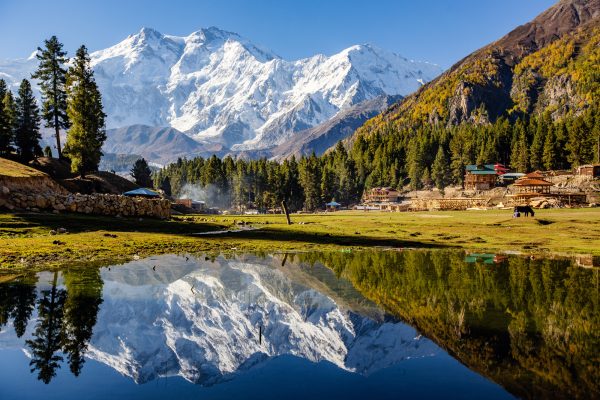Few months back authorities in Gilgit-Baltistan launched a crackdown on illegal mining activities in areas such as Danyore, Chilas, and Karagh. Led by the Director of Minerals, the operation was aimed to regulate the mining industry, seize illegally mined resources, and hold violators accountable. However, this effort was largely a short-term measure aimed at appeasing the local population and creating the impression of decisive action after concerns emerged regarding the exploitation of the region’s mineral wealth by foreign companies, particularly Chinese firms. These activities frequently occur with minimal consultation or tangible benefits for local communities, raising serious issues surrounding transparency, equitable resource distribution, and the rights of indigenous populations. In practice, the state continues to award lucrative mineral leases, worth billions of dollars, to non-local companies, raising concerns about the true priorities of the authorities.
The geology of In Pakistan-occupied Gilgit-Baltistan (PoGB) is remarkably diverse and rich, featuring an extensive range of mineral deposits. These include metallic and non-metallic minerals, energy resources, as well as an array of precious stones, dimension stones, and industrially valuable rocks. The region is a natural repository of numerous important mineral resources, making it a hub of geological wealth.
Among the major deposits found in the area are nickel, cobalt, copper, lead, tin, mica, quartz, zircon, and coal, as well as other significant materials. Notably, surveys conducted in the region have confirmed the presence of precious minerals, including gold, scattered throughout the landscape. The region’s mineral wealth extends to its gemstone reserves, with earlier data revealing that approximately Rs 500 million worth of gemstones were being extracted annually from Gilgit-Baltistan.
However the GB Mines & Mineral Department faces persistent and deep-rooted challenges that hinder its effective functioning. These include a chronic shortage of both human and financial resources, compounded by undue interference from political leadership and government officials. Endemic corruption further exacerbates the situation, with reports suggesting that many GB politicians and influential stakeholders within the current government hold personal mining leases or act as silent partners, earning fixed-percentage commissions from mining operations.
The department’s weak oversight and supervisory mechanisms, coupled with corrupt practices, have allowed mining companies to engage in various forms of malpractice. These include irregularities in the exploration and transportation of valuable resources such as precious stones, metals, and industrial rocks. Additionally, the department lacks critical information about the region’s mineral wealth, as no comprehensive scientific surveys are available to guide its operations.
Although the Geological Survey of Pakistan (GSP) has conducted multiple surveys, including the most recent one in 2023-24, it has reportedly refused to share its findings with the GB Mines & Mineral Department. Similarly, the Pakistan Minerals Development Corporation (PMDC) carried out a survey on the region’s mineral resources several years ago but has also declined to provide its report, despite repeated requests. This lack of access to vital data further undermines the department’s ability to manage and regulate the region’s rich mineral resources effectively. These systemic issues highlight the urgent need for reforms to ensure transparency, accountability, and sustainable resource management in the region.
Meanwhile, the constraints on official international investments in Gilgit-Baltistan, largely stemming from persistent corruption and security challenges, have inadvertently paved the way for the growth of an unchecked and thriving illicit mining sector. Corruption within administrative and regulatory bodies creates barriers to attracting legitimate foreign investments, deterring international companies that prioritize ethical practices and transparent dealings. Furthermore, ongoing security concerns in the region amplify these challenges, making it an undesirable destination for potential investors.
Foreign involvement in mining operations has become increasingly prevalent, with Chinese companies playing a significant role. These entities have obtained mining leases and are actively extracting valuable resources such as copper, gold, and uranium. For example, Chinese miners hold leases in the Astore district for high-grade copper extraction and are involved in tunnel construction and mineral exploration in areas like the Chapursan Valley in upper Hunza. Furthermore, Shahzad International, a firm collaborating with Chinese investors, ranks as one of the largest foreign contractors in the region, focusing primarily on the extraction of uranium and gold, as noted by the Economic Times.
This extensive foreign participation has triggered concerns among local communities about issues like transparency, fair distribution of resources, and environmental consequences. Reports suggest that foreign entities, particularly Chinese firms, have generated tension by allegedly withholding revenue derived from resource exploitation, sparking fears over threats to the rights of natives regarding their land and resources.
The situation highlights a strong demand for greater inclusivity and transparency in resource management. It underscores the importance of drafting policies that reflect the wishes of the local communities, ensuring that they benefit from the region’s vast mineral wealth while preserving their cultural and economic rights. The resistance from local organizations signals a broader struggle for resource sovereignty and equitable development in Gilgit-Baltistan. These issues highlight the urgent need for comprehensive reforms to ensure ethical and sustainable resource management in the region.

